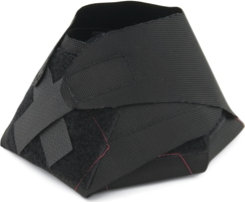Kayden wrote and asked about disciplining her horse: "I don't want to be unnecessarily rough with my horse but I am confused on not only what I should be disciplining my horse for but how to do it. I know that some behavior doesn't necessarily mean the same level of discipline or punishment. I think I would want to err on the side of caution though, your thoughts?"
Well, the first thing I would do is start thinking in terms of correcting your horse, helping him find the right answer, as opposed to disciplining him which is more akin to punishment. Correction has a positive connotation while discipline often seems to be a negative approach. In the world of training humans some people would call punishment as a motivation to learn as “negative re-enforcement”.
Horses are not going to rationalize the why on punishment. You run the risk of proving your horse right when he thinks he can't trust you, which he has an instinct for anyway.
An example of helping him find the right answer is - if a horse won't stand still for mounting I may make him move around in a circle a couple times with some energy, then offer to let him stand still - and he often will right away. Sometimes I may have to do this a couple times before the right answer is apparent with him. The right answer in this case is standing still. The point here is that you are correcting him by helping him find the right answer. This is often expressed as making the wrong thing difficult, the right thing easy. This is simple enough to understand but difficult to do when we let our emotions especially frustration and anger get in the way. You just can't take it personally. And honestly, this is something I've struggled with as I'm ashamed to say I always didn't think this way..
Another example could be if the horse walks off as I am getting my seat, I’ll back him up a few steps with energy then offer to let him stand still. Again, correcting him and helping him find the right answer. Imagine mounting and the horse moves off on his own accord then you jerk on his mouth then whack him, what will he do?. He may bolt or maybe not, but you have increased his anxiety. Now he may be thinking that his moving was justified because of having his mouth jerked on and being whacked or whipped. This is counter-productive.
Yet another example may be trimming or cleaning a horse’s hoof. How often have you seen a horse try to take back his foot jerking a person, sometimes the farrier off balance. An impatient horse shoer will get mad and try to hit or kick the horse which only increases the horse’s anxiety and justifies him not wanting to give his foot and diminish his ability to run away. If you would hold onto the horse’s foot even if he is jumping around a little you would soon get to a place where the horse’s relaxes, then you immediately give him back his foot. He begins to learn that when he gives his foot to you, he’ll get it back.
Again, correction as opposed to punishment, and using the practice of making the wrong thing difficult, the right thing easy, is going to be your best bet to solve most all of your horse related behavior issues.



















No comments:
Post a Comment